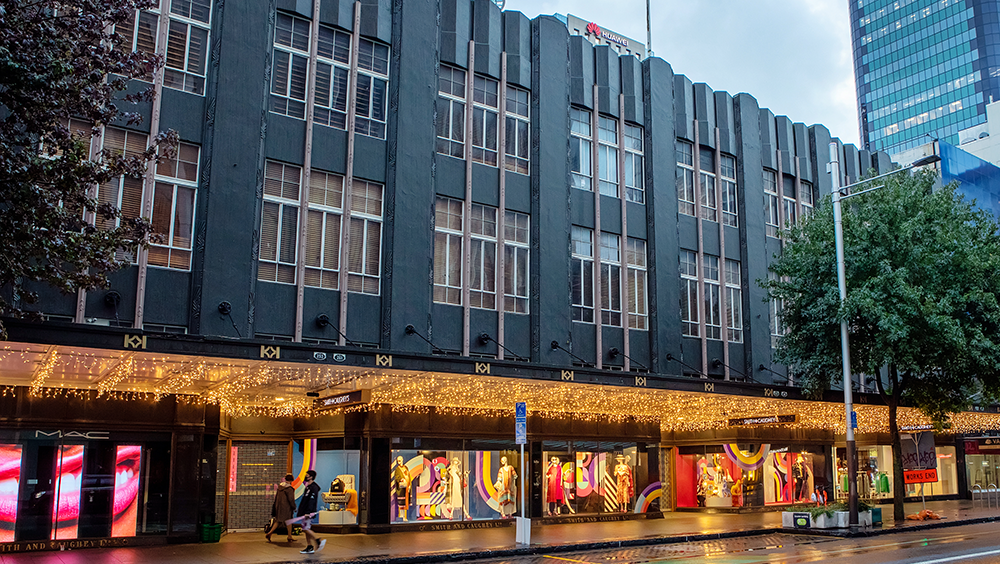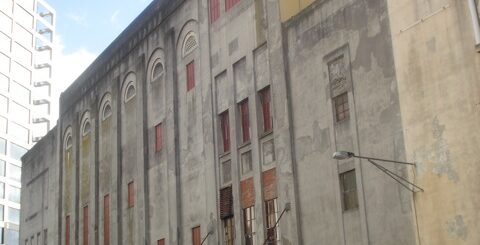Adieu to Auckland’s Grande Dame? – Smith & Caughey’s proposed closure another blow to the central city

The news of the proposed closure in 2025 of Smith and Caughey’s with the loss of nearly 250 jobs came as sad blow not only for the staff but for many other Aucklanders as well.
The 144-year-old Grande Dame is the oldest and last survivor of a cohort of department stores like John Courts and Milne & Choyce which once graced Queen Street, along with George Courts on Karangahape Road and the Farmers on Hobson Street.
These were progressively lost to the city, especially after the commercial mayhem of the 1980s and the predatory activities of once lionised ‘corporate raiders’.
But despite all, Smith & Caughey’s, in its stately Victorian building with art deco-esque frontage, carried on. A prudently managed family business, owned by generations of descendants of founder Mary-Ann Caughey (now numbering some 68). A grand emporium, a treasure house, with its Christmas window displays – the delight of children to this day; an elegant survivor of Auckland’s golden age, of a time when Aucklanders were outspokenly proud of their bustling and still beautiful city.
A reminder of that time can be seen on Netflix. ‘Ladies in Black’, set in 1959 Sydney, is a light-hearted but evocative movie about a fictional department store ‘Goodes’ (believed to be David Jones). Interestingly department stores like David Jones and Myer are still going strong in Sydney, Melbourne and other cities, so why not in Auckland?
Some of the reasons were outlined by the chairman of Smith & Caughey’s, Tony Caughey. Since 2019 especially a major decline in foot traffic on Queen Street bringing a 40% decline in revenue. At the same time he pointed to the after-effects of covid, crime and safety issues, the economic downturn, designer brands like Gucci choosing to open their own stores, and competition from new shopping malls like Westfield Newmarket with their hectares of free parking.
But many of these global factors are in play in Australian cities too – so what is different about Auckland? Heart of the City’s Viv Beck recently told the council’s Transport & Infrastructure committee that retail trading in the inner city is now ‘tough going’. In particular she pointed to the dramatic fall in people coming to the city ‘around Queen Street’ compared to pre-covid, down by 50,000 per day.
In terms of transport she reported a reduction since 2015 by 19,000 private vehicles per morning peak, but worryingly that all transport modes (including PT) were down 41% – a loss of 33,000 people/trips per morning peak to the inner-city.
Both Mr Caughey and Ms Beck were too polite to say it – but I will. Over recent years, the commercial vitality of the city centre has been progressively damaged by poorly advised, ideologically driven council/AT policies. At enormous expense, Queen Street has been reduced to two narrow lanes – often dominated by empty or almost empty buses; the footpaths used by beggars and rough sleepers. On-street parking, vital for retail, has been reduced to insignificance. Now, even driving to and on Queen Street is a mission. Indeed from the Mayoral Drive to the Civic Theatre, AT has set up a revenue trap wherein in 16 months a stunning $12 million of fines have been issued to unwitting drivers. Though the council’s non-statutory ‘City Centre Master Plan’ promises an ‘accessible, inclusive and prosperous city centre’, council’s so-called ‘transformational moves’ are creating the opposite; blockading and progressively hollowing out the city’s retail centre. Unfortunately, Council and AT seem completely indifferent to the damage this is doing. Coming up is AT’s imposition of 24-hour parking charges, the closure of Wellesley Street West (from Queen to Federal Street) to cars, and the sale and demolition of the Downtown Car Park Building.
The City Rail Link (CRL) was meant to be a lifesaver for the city but it’s disruptive construction is taking more than twice as long to complete as originally planned and likely costing three times as much as claimed in its business case. But the widespread assumption, almost an article of faith, is once the CRL is opened in 2026, thousands of people will come flooding into the city.
While that might have been likely when construction began in 2016, I’m not sure whether it’s still a safe bet. The closure of Smith & Caughey’s is just one more reason why assumptions of the CRL bringing multitudes of people to the city centre can no longer be taken for granted. Things must change or by the time the CRL is opened not that many Aucklanders may still want to come.
This article was published in the July 2024 issue of Ponsonby News.
UPDATE. In late July the chair of the board of Smith & Caughey. Tony Caughey announced a rescue plan which included the closure of the department’s store’s upper floors but retention of the ground floor which will stay open for business. Aucklanders will be very grateful.



